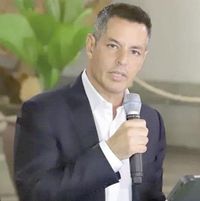In a dramatic turn of events within the Mexican political landscape, former Oaxaca governor and current senator Alejandro Murat Hinojosa is facing intense scrutiny and resistance from members of his own party, Movimiento de Regeneración Nacional (Morena). As Murat seeks to solidify his affiliation with the party, legislators have voiced their strong opposition, urging him to withdraw his registration. This internal conflict underscores the broader tensions within Morena as it navigates the complexities of political inclusion and ideological purity.
Local and federal legislators from Morena have reiterated their rejection of Murat's affiliation, citing concerns over his past governance, which they argue has left Oaxaca burdened by a staggering public debt of approximately 32 billion pesos, a devastated health system, and numerous unfinished projects. "We maintain our rejection for Alejandro Murat to join Morena because our principles, values, and ideologies that gave rise to this movement do not allow us to have within the party characters who acted against the people and harmed the people of Oaxaca," declared local deputy and president of the Political Coordination Board of the 66th Legislature, Benjamín Viveros Montalvo.
The call for Murat to step back from his registration was echoed by several senators from Oaxaca, including Laura Estrada Mauro, Antonino Morales Toledo, and Luis Alfonso Silva Romo, all aligned with the current governor, Salomón Jara Cruz. They have urged Murat to follow the example of Miguel Ángel Yunes Márquez, another former member of the Institutional Revolutionary Party (PRI) who recently withdrew his request to join Morena amidst similar criticisms.
Despite the mounting pressure, Murat has firmly stated his intention to remain in the party. "I see the opposition as very weak. We are firm here, and I have already said it clearly and I reiterate it today: Don't get confused!" he asserted, emphasizing his loyalty to President Claudia Sheinbaum and the Fourth Transformation project. His defiance has sparked further debate about the compatibility of political pragmatism with the ideological foundations of Morena.
The situation has been complicated by the recent decision of the National Commission of Honesty and Justice (CNHJ) of Morena, which denied Yunes Márquez's request for affiliation, a move celebrated by many within the party as a moral victory. This precedent has set the stage for the internal conflict surrounding Murat, as party members question whether Morena can effectively absorb figures from the old regime without compromising its core values.
As tensions rise, Murat's critics within the party have not held back. They argue that his family's legacy is synonymous with corruption in Oaxaca and that accepting him into Morena would be a betrayal of the movement's principles. Morales Toledo stated, "Morena is a movement built from the struggle of the people, with clear principles of justice, democracy, and transformation. Defending our movement is defending its essence and its commitment to the people." This sentiment reflects a broader unease among some members who feel that the party's integrity is at stake.
The internal strife highlights a significant ideological divide within Morena, raising questions about the party's identity and future direction. Can a party founded on anti-corruption principles truly integrate members with questionable pasts? This dilemma not only affects Murat but also poses a challenge for the party as it seeks to maintain cohesion and a clear ideological stance.
As the debate continues, Murat remains steadfast in his commitment to the party and its leadership. "We are firm here, I have already said it clearly and I reiterate it today: Don't get confused!" he reiterated, dismissing calls for his resignation. His comments reflect a determination to navigate the turbulent waters of party politics while upholding his vision for Oaxaca and Mexico.
In the backdrop of this political drama, the question remains: how many factions truly exist within Morena? The party's narrative of inclusion is being tested as members grapple with the implications of integrating former PRI members, particularly those with controversial legacies. The outcome of this internal conflict could shape the future of Morena and its role in Mexican politics.
As the April 2025 election cycle approaches, the stakes are high for Murat and for Morena. The ongoing tensions within the party may not only affect its internal dynamics but could also influence its electoral prospects. With factions forming around different ideologies and priorities, the party's ability to present a united front will be crucial in the face of upcoming challenges.
In conclusion, the situation surrounding Alejandro Murat's affiliation with Morena serves as a microcosm of the broader struggles facing political parties in Mexico. As they navigate the complexities of inclusion, ideology, and electoral strategy, the decisions made in these critical moments will reverberate throughout the political landscape for years to come.






